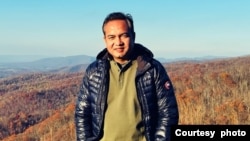Paranoia has become something of a way of life for Sarada Taing, ever since the journalist received violent threats from a pro-government social media personality in Cambodia in June.
In one audio message sent via Facebook Messenger on June 19, Pheng Vannak, a former police officer, said he “wants to chop my head if I come to Cambodia,” said Taing, who lives in Washington.
In a second audio message, the caller said he knew people in the United States who also hated Taing. Days later, on June 22, Vannak hosted a Facebook Live discussion, during which he said he would not think twice about killing Taing.
Both messages — reviewed and translated by VOA — are profanity-laced tirades that include threats of sexual violence against the journalist’s family.
"I feel really shocked, and I got really scared. My family is very scared,” said Taing. “I don’t have any mechanism to protect myself very much.”
Corruption accusation
Taing said Vannak had harassed him for several years, but the latest incidents appeared to come after the media outlet Taing works with aired a report about a Cambodian businessman accused of corruption.
Vannak, who runs a Facebook news page with nearly 685,000 followers, did not reply to a VOA request for comment.
A dual U.S.-Cambodian citizen, Taing is chief correspondent at The Cambodia Daily, a media outlet that operates in exile under the name of an independent English-language media outlet shuttered in 2017.
On his Khmer-language video show “Idea Talk,” Taing attracts between 50,000 and 80,000 viewers as he challenges the Cambodian government on corruption, human rights, environmental issues and other topics.
Taing said his experience of being harassed underscores the even steeper challenges for journalists who work inside Cambodia. Most independent news outlets there have been shuttered and authorities harass critical reporters, press freedom watchdogs say.
Taing’s experience accentuates trends that exist beyond Cambodia, too, with authoritarian governments targeting dissidents outside their borders in a tactic known as transnational repression.
Freedom House documented 10 cases of physical transnational repression perpetrated by the Cambodian government between 2014 and 2022, according to Grady Vaughan, who co-authored the nonprofit’s December report on transnational repression targeting reporters.
“They don’t want any opposition forming in exile,” Vaughn said, referring to Cambodia’s authoritarian government. “So they try to intimidate these people into silence.”
Media watchdogs including Reporters Without Borders, or RSF, and local journalists still working inside Cambodia echo Taing’s concerns.
“Press freedom in Cambodia is in a deplorable state,” RSF’s Arthur Rochereau told VOA from Taiwan.
Still, audiences inside the country rely on the few independent voices — including those run from exile — that report.
“People depend on us so much,” said Taing, who moved to the United States in 2008. “The most important thing is they want to hear the truth about what’s happening, about what’s going on in Cambodia.”
Online harassment is par for the course with reporting on Phnom Penh, but Taing said the June threat was more extreme than anything faced previously.
During a reporting trip to New York in September, Taing said he felt nervous while covering a protest against Cambodia’s newly installed leader, Prime Minister Hun Manet, the son of Hun Sen, who led the country for nearly four decades of strict rule.
"I have to be really careful. I don’t know who likes or who doesn’t like me,” Taing said.
Foreign-based news sites blocked
The threats against Taing came just a few weeks before a major Cambodian election in July. Ahead of the election, the Cambodian government blocked multiple foreign-based news websites, according to Rochereau.
Cambodia’s democratic transition in the early 1990s brought a vibrant media landscape, according to Rochereau. But “2017 marked a turning point as former Prime Minister Hun Sen and his clan, fearing a loss of power, launched a war against Cambodian media,” he said.
Out of 180 countries, the Southeast Asian country now ranks 147th in terms of press freedom, according to RSF.
This new period has been punctuated with media closures, including earlier this year when authorities shut Voice of Democracy, one of the few remaining independent outlets.
Cambodia’s Washington embassy did not reply to a VOA email requesting comment.
The environment takes a toll on journalists like Mech Dara who still work inside Cambodia. When Voice of Democracy shut down, it was the third time an outlet Dara worked at had been silenced.
He worked at The Cambodia Daily when it was shuttered in 2017. The following year, he worked at The Phnom Penh Post when the outlet was sold to a public relations firm that had done work for the government.
“The space is getting narrower, and the stakes are very high,” Dara, now a freelance journalist in Cambodia, told VOA.
This fall, Voice of Democracy relaunched from the United States.
Every step in the reporting process is a struggle in Cambodia, Dara said, from pitching stories and finding sources to the intimidation and harassment that can come after stories are published.
The journalist said he has been arrested before over his work but added that’s just part of the job.
“We are fearful,” Dara said. “But I am the one who picked this path, so I have to walk through that path. I know that something could happen, but I don’t know when. I don’t know how.”
'I fear for my life'
Back in Washington, family is top of mind for Taing. He lives with his young son, his wife and her elderly parents.
In an effort to improve their security, Taing changed the locks on his doors, added a digital security code and installed video surveillance. He said he also emailed the FBI and the State Department.
“I fear for my life and the life of those close to me due to my work as a journalist,” he wrote.
But more than anything, Taing worries about his family members who still live in Cambodia.
Despite safety concerns, Taing said he has never considered stopping his work. He said a love for his birth country motivates him.
"I want to see Cambodia have more freedom, more democracy and respect of human rights,” Taing said. “I want the Cambodian people to have real democracy, to have real peace, to have justice.”









